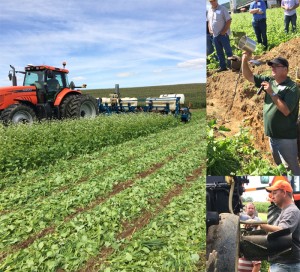
(L) At Criswell Farms a cover crop mix is rolled, and blades open up a space to immediately plant the next crop. (R) John Chibirka demonstraes water infiltration on Jim Harbach’s Schrack Farms (Bottom) Lucas Criswell shows how alterations to equipment enabled planting and rolling at once.
Farmer interest and innovation in cover cropping is reaching new heights as witnessed by hundreds of farmer attendees at 2 farm events organized by the PA No-Till Alliance in late August. Upgrades and improvements in equipment – many of them designed by farmers – provide almost unsurpassed control in cover cropping and reseeding into no-tilled soils. On Lucas Criswell’s farm (Lewisburg PA) growers experienced how to roll cover crops and seed into them in a single operation. At Schrack Farms Partnership (Loganton), Jim Harbach’s methods have “significantly improved a soil not normally classed as highly productive” according to visiting soil scientist John Chibirka, who found excellent infiltration rates (>4″/hr) and earthworm activity in the soil. -NOTE: Jim Harbach testified on soil health Sept 18 2014 before the House Agriculture SubCommittee. His remarks on water infiltration and reduced chemical usage drew attention of committee members.
According to Brinton , improvements in cover crop tools are particularly striking to “old timers”, who told the PA audience: “When I studied farming in the 70’s, we called cover-cropping ‘green manuring’ and that meant turning plants into the soil with heavy discs or plowing – an approach that seems contradictory today”. Pennsylvania farmers are among many that have innovated farming approaches to rarely disturb the soil. With smart, customized machinery that lay down green manures while planting into them with an absolute minimum of chemicals. Once upon a time it was the organic growers in the UK and USA who lead these innovations, now is the cover-crop-no-till community. It is very likely that organic farming and cover-crop no-tilling will converge more and more as method innovation continues. One example is that farmers using cover crops are “drastically reducing the need for herbicides, since the cover crops are such good weed prevention aids in the rotation-“- Jim Harbach. At the same time, organic farmers are seeing the need to reduce tillage that speeds destruction of soil humus and reduce invertebrate populations.
